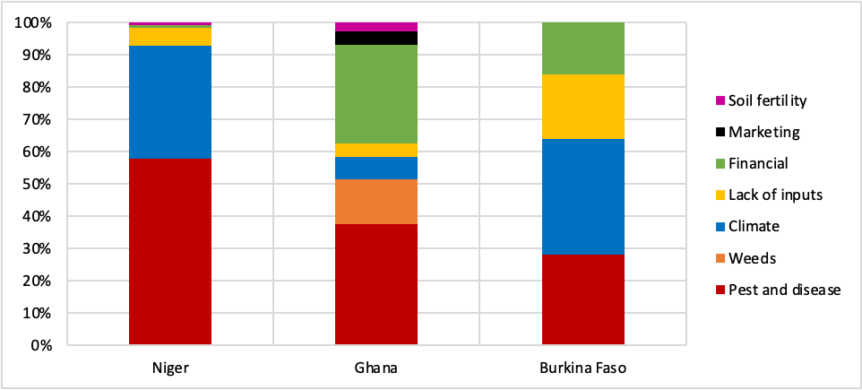Authors: (CIHEAM Bari – Andi Mehmeti, Generosa Jenny Calabrese, Mladen Todorovic)
African agriculture and food systems are constantly under pressure due to a set of inter-connected factors including an underdeveloped agricultural sector, intensification of adverse climatic events, limited quality and availability of resources (land and water), population growth, and lack of funding and use of new technologies. The consequences of the COVID-19 pandemic have increased the vulnerability of agricultural value chains to external shocks. Notably, the joint adoption of sustainable agroecological practices and modern agricultural technologies would have the potential to significantly boost African agriculture and make it more productive, competitive, sustainable, and inclusive. Technological advancement and innovation in the field of agriculture are instrumental to ensure food security (sufficient, safe, nutritious food) and reducing poverty paving the way to sustainable intensification of the whole area.
SustInAfrica is a research project aiming to empower West and North African smallholder farmers and small- and medium-sized enterprises (SMEs) and facilitate the sustainable intensification of African farming systems. It aims to demonstrate and introduce resilient and sustainable agro-ecological production practices as well as smart farming technologies in Ghana, Burkina Faso, Niger, Egypt, and Tunisia to successfully intensify food production and increase the provision of ecosystem services. The project SustInAfrica is currently conducting surveys to gain a deep understanding of the current state of selected farming systems in 13 target agro-ecological zones in the five countries in the West and North Africa investigating agro-environmental, agronomic and socio-economic aspects. In this article, we synthesize the preliminary results from the surveys, reporting the perception of farmers of the challenges and threats to production and a preliminary brief overview of the present diffusion and level of adoption of agro-ecological practices and ICT from African smallholder farmers.
Challenges and threats to production
In recent years, agricultural production and yields in sub-Saharan Africa remained lower than in the rest of the world. Low productivity is related to poor soil fertility and scarce moisture, as well as to a variety of pests (insects, diseases, and weeds). So far, 242 smallholder farmers in Ghana, Niger, and Burkina Faso have been polled about the main challenges and threats to crop production (Figure 1).
Pest and diseases were consistently cited as the number one obstacle to yield increase; this issue was followed by climate-related constraints. Smallholders in Ghana consistently cited the lack of access to affordable finance. Recent investigations (Ratnadass, 2020) confirm that pests, diseases, and weeds as major constraints to cropping system intensification in sub-Saharan Africa Plant. They influence the availability and safety of plants produce for human and animal consumption, reduce crop yield and detrimentally affect the quality (Rizzo et al., 2021). Other challenges included lack of genuine inputs, marketing issues, and soil fertility. The high prevalence of counterfeit agricultural goods in rural African markets results in a reduction in income, increased risk to health and safety, and reduced trust in inputs (de Boef et al., 2019). Rainfall deficit was the main climatic issue identified. Irrigated systems are less often affected by drought than rainfed systems, but farmers in Sub-Saharan Africa are particularly vulnerable because they mostly rely on rain-fed agriculture (Meza et al., 2021).

Access to agro-ecological and farming practices
So far, 242 smallholder farmers in Ghana, Niger, and Burkina Faso were asked about production practices (e.g. cover crops, intercropping, crop rotations with forage legumes, alley crops, farmyard manure, mulching methods, reduced tillage, etc.) they apply on the farm (Figure 2). Both agro-ecological and conventional practices were considered. The following practices have been documented to generate environmental, economic, and social benefits.
Crop rotation or crop diversification (the practice of growing a series of different types of crops in the same area across a sequence of growing seasons) is extensively applied in Burkina Faso but to a limited extent in Ghana and Niger. The adoption of rotation has been promoted for decades to enhance yields, and ensure a lower incidence of weeds, insects, and plant diseases. Limited access to knowledge, technology, unavailability of seeds, markets for minor crops, and concerns about the consistency of policies are highlighted by farmers as barriers to crop diversification (Alleto et al., 2022).
Irrigation (supply of water to crops, designed to permit farming in arid regions and to offset drought in semiarid regions) is partially implemented in Ghana and Niger. The crop growing in Burkina Faso is mainly rainfed. Lack of access to water, water scarcity, lack of access to reliable energy for irrigation, and lack of capital or affordable credit lines to purchase pumps and other types of equipment are the major hindering factors of irrigation development in Africa. In Ghana and Niger, rainwater harvesting is applied as an effective water supply solution to face water scarcity and bolster rain-fed crop production of small hold farmers. Water harvesting helps to stabilize yields in case of water shortages by a low supply of rainwater in rain-fed agriculture. The major barriers to adopting rainwater technologies are costs and a lack of expertise in the adoption of these technologies (Wekesa et al., 2022).








Tillage (mechanical manipulation of the soil for crop production) is essentially applied in Niger and Burkina Faso and to a lesser extent in Ghana. African farm systems are the least mechanized across all continents (Daum et al., 2020). Tillage is usually performed manually using hoes of different types. The preliminary data show that access to tractors and farm machinery (tractors, combine harvester, thresher, manure spreader and fertilizer distributor, plow, etc.) for mechanized farm production is very limited in Ghana and Niger. For example, Ghana would need more than 30,000 tractors but currently, less than 2,000 operate (TractorsforAfrica, 2022).
Limited access to fertilizers leads to prohibitively high costs of such input, resulting in smallholder farmers using less or not at all. Therefore African farmers are encouraged to explore alternatives such as organic fertilizer to be applied to their crop production. Compost (organic fertilizer prepared through aerobic decomposition of organic matter from plant and animal origin) is one alternative to mineral fertilizers. Our data show that composting is partially implemented in Ghana and to a limited extent in Niger and Burkina Faso. Barriers to using compost include the high cost in case of purchase, the uncertainty of product availability when it is needed, complex regulations, lack of knowledge and experience with using compost, low quality of available compost, and the perception of the risk of increasing weeds and diseases. A pest management and control strategy would help farmers to decrease pest impacts (e.g., birds, rodents, reptiles, and insects). This is important also for the preservation of biodiversity and environmentally friendly agricultural production. The level of adoption of IPM practices varies across the considered sample depending on a range of factors related to both farm typology and farmer characteristics (Creissen et al., 2021). In developing countries, the most frequent obstacle is “insufficient training and technical support to farmers (Parsa et al., 2014). Pesticide management throughout Africa is characterized by a lack of post-market surveillance capacity across much of the continent to ensure that only properly registered materials are reaching farmers (Prasanna et al., 2018).
Access and use of ICT Information and Communication Technology (ICT) supports farmers in many ways: by facilitating access to markets through real-time data on market prices, or providing weather forecasts, information on pests, seed varieties, and/or planting techniques. ICT is an umbrella term that includes the use and support of any communication device, encompassing radio, television, cell phones, computer and network hardware, satellite systems, and so on. For example, mobile phones have the potential to connect farmers to markets, close the information gap and enable informed decisions. Ownership of mobile phones (portable telephone subscribing to a public mobile telephone service using cellular technology, which provides access to the PSTN) is an important tool of access to vital information for farming.

According to our survey, in studied AEZ, more than 75% of the households own a mobile phone (Ghana 79% ownership rate, Niger 81% ownership rate, and Burkina Faso 100%). Though when it comes to smartphone ownership (mobile handset that is used as the person’s primary phone device which has smart capabilities, including Internet-based services), only 31% of households in Ghana, 30% in Niger, and 18% in Burkina Faso reported owning a smartphone. Similarly to smartphones, even access to the internet was reported low: Ghana with 24%, Niger with 27% ownership rate, and Burkina Faso with 9%. Lack of basic literacy and numeracy presents a significant barrier to using digital technologies. Low overall smartphone ownership in rural areas, combined with the high cost of the internet and limited network coverage, also present challenges to the use of mobile agricultural applications and limit the scope to use of social networks (FAO, 2019). Only 7% of households in Ghana reported having a computer. The data reveals that radio ownership is higher- the majority of households are reported to be radio-equipped: 59% in Ghana, 55% in Niger, and 91% in Burkina Faso. Households with television (%) were reported at 63 % in Ghana, 10% in Niger, and 27% in Burkina Faso.
SustInAfrica positioning existing technologies & practices
SustInAfrica aims to bring the latest research and technologies from the field and laboratory into the hands of farmers and agribusiness men across Africa so that the end-user can take advantage of recent developments in the area of sustainable agricultural management, smart farming, and integrated pest management. The project is currently testing technology-based innovations for irrigation, biological pest and disease control, and support for the agricultural value chain as well as farming practices such as compost, biochar, cover crops, intercropping, pest control, bio-fertilizers, and conservation tillage. The results of the surveys will allow proposing tailored solutions for the different areas so that ICT investments could be an effective tool to improve yield amount, and food quality and to improve the overall sustainability of farming and food systems as well as the whole community resilience.

